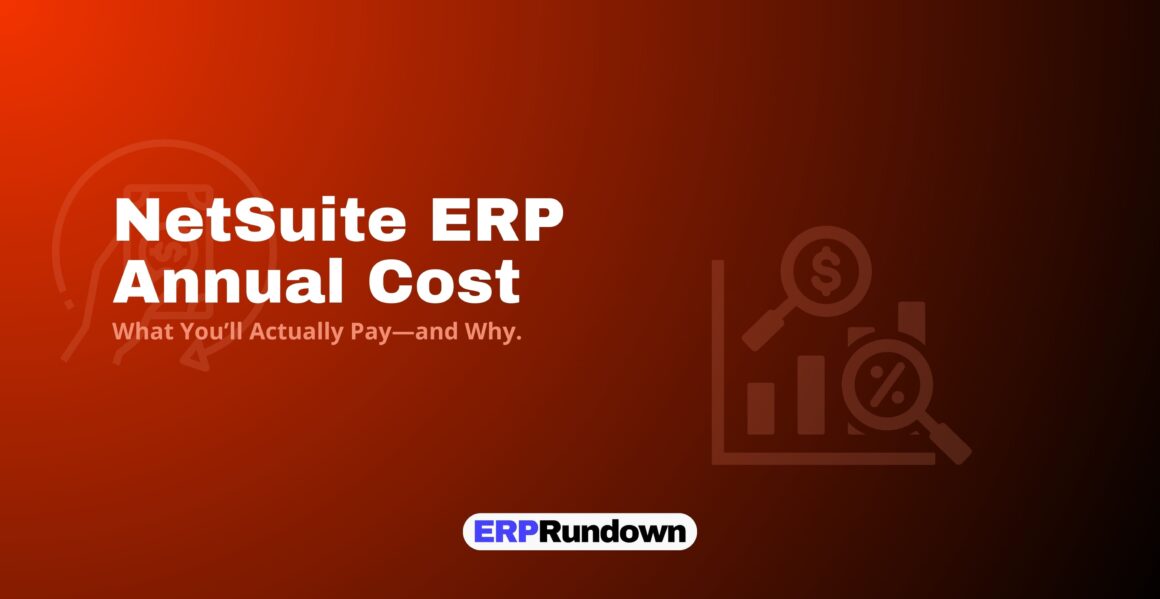If you’re considering NetSuite, one of the first questions you’re probably asking is: How much does NetSuite cost per year? It’s a fair question—and the answer depends on several variables like user count, chosen modules, implementation needs, integrations, and support level.
This guide breaks down every cost factor in detail. We’ll show you exactly how NetSuite’s pricing works in 2025, and help you understand what to expect for your annual budget.
What Is NetSuite and Why Is It Priced This Way?
NetSuite is a cloud-based ERP platform designed to handle everything from accounting and CRM to inventory, ecommerce, and professional services automation. It uses a modular pricing model—meaning you pay only for what you use.
So, how much does NetSuite cost per year? The answer depends on your business size, industry, and complexity. But don’t worry—we’re about to break it all down.
NetSuite’s Core Cost Structure
1. Base Platform Fee
Every NetSuite customer starts with a core platform license.
- Starting at: $999/month
- Annual cost: $11,988
This covers basic ERP functionality: general ledger, accounts payable, accounts receivable, bank reconciliation, and reporting. It’s required before anything else.
2. User Licenses
NetSuite licenses users on a named-user basis. Each person who logs in regularly needs their own license.
| User Type | Monthly Cost | Annual Cost |
| Full User | $99 – $129 | $1,188 – $1,548 |
| Employee Center User | ~$15 | ~$180 |
Example: 10 full users at $129/month = $15,480/year.
NetSuite Modules Pricing (2025 Estimates)
Your industry and use case determine which modules you need. Here’s a breakdown of commonly used modules and their approximate monthly prices:
| Module | Monthly Cost | Annual Cost |
| Advanced Financials | $499 | $5,988 |
| Inventory Management | $599 | $7,188 |
| Demand Planning | $499 | $5,988 |
| Fixed Assets | $399 | $4,788 |
| Project Management | $399 | $4,788 |
| Advanced Revenue Management | $999 | $11,988 |
| SuitePeople (HR) | $499 | $5,988 |
| CRM | $399 | $4,788 |
| Manufacturing | $999 | $11,988 |
| WMS (Warehouse Management) | $1,499 | $17,988 |
| SuiteCommerce Standard | $199 | $2,388 |
| SuiteCommerce Advanced | $2,000+ | $24,000+ |
Important: These are rough ranges and subject to negotiation. Bundle deals are often available.
Implementation Costs
NetSuite is not a plug-and-play solution. Proper implementation is critical.
| Business Size | Implementation Cost Range |
| Small (1-20 users) | $25,000 – $50,000 |
| Midsize (20-100) | $50,000 – $150,000 |
| Enterprise (100+) | $150,000+ |
What’s included:
- Business process mapping
- Data migration
- Customization and scripting
- Testing & training
- Go-live support
Many businesses work with a NetSuite partner (VAR) for implementation. Some include training and light customization.
Integration Costs
If your business runs tools like Salesforce, Shopify, or ADP, you’ll need integrations.
| Type | Cost |
| Prebuilt Connectors | $2,500 – $10,000/year |
| Custom Integrations | $10,000 – $50,000+ one-time |
Integration platforms like Celigo or Dell Boomi offer out-of-the-box options, but custom APIs or connectors may be required.
Training and Support
Training
| Training Type | Cost Range |
| Self-paced | Free – $2,000 |
| Guided training | $2,500 – $7,500 |
| Custom team training | $5,000 – $15,000 |
Support
Basic support is included, but premium options offer faster SLAs, 24/7 access, and account managers.
- Premium support: $5,000 – $15,000/year depending on license size.
Year-One vs Ongoing NetSuite Cost (Example Scenario)
Let’s say you’re a mid-sized business with:
- 10 full users
- 3 modules (Advanced Financials, CRM, Inventory Management)
- SuiteCommerce Standard
- One integration
- Guided training
- Full implementation
Year One Estimate
| Item | Annual Cost |
| Base License | $11,988 |
| User Licenses (10) | $15,480 |
| Modules (3) | $17,964 |
| SuiteCommerce Standard | $2,388 |
| Integration (prebuilt) | $5,000 |
| Training | $5,000 |
| Implementation (one-time) | $50,000 |
| Total Year One | $107,820 |
Ongoing Annual Cost (Post-Implementation): ~$57,820
What Drives NetSuite Costs Higher?
1. User Count
Every new user adds to the total. Optimize your licensing by assigning the right access level—many roles don’t require full user licenses.
2. Complexity of Implementation
A multi-subsidiary business in multiple countries will cost more than a single-entity domestic company. Features like OneWorld, tax automation, or intercompany consolidation can increase both time and cost.
3. Custom Workflows and Automations
Custom SuiteScript and complex workflows require developer time, driving up implementation and support costs. Lean on NetSuite’s native features when possible.
4. Integration Needs
The more systems you need to connect—CRM, eCommerce, HR—the higher the integration cost. Custom APIs are powerful but expensive.
5. Data Migration Complexity
Clean data is cheap to migrate. Disorganized, fragmented data across systems adds time, complexity, and cost.
Negotiating NetSuite Pricing: Best Practices
NetSuite pricing is negotiable—especially when purchasing through a partner. Here’s how to drive it down:
1. Compare Multiple Quotes
Don’t go with the first offer. Get pricing from NetSuite directly and from a few partners. Use quotes as leverage.
2. Buy at the End of the Quarter
NetSuite and its partners are often more flexible with pricing near the end of a sales quarter. Use timing to your advantage.
3. Bundle Your Modules
Buy several modules at once to ask for a bundle discount. Purchasing them individually over time often costs more.
4. Sign Multi-Year Contracts
Most NetSuite pricing is annual, but committing to 2-3 years can get you a better rate.
5. Negotiate Services, Too
Don’t just negotiate license fees. Get discounts on implementation, training, and support services.
Best Practices to Keep NetSuite Costs Manageable
Here’s how to keep NetSuite annual costs easily manageable:
- Start with Essentials: Avoid overbuying. Start with what you need now and scale later.
- Limit Customizations: Use native functionality as much as possible before building custom scripts.
- Plan for Growth: Choose modules and partners that support your growth without constant rework.
- Use Tiered Access: Not everyone needs a full license. Assign roles wisely.
- Track ROI: Monitor how NetSuite drives efficiency or savings. This will justify the cost and guide upgrades.
How Much Does NetSuite Cost Per Year?
If you’re still wondering how much does NetSuite cost per year, here’s a recap:
- Small business: $25,000 – $50,000 (Year One)
- Mid-sized business: $50,000 – $100,000+ (Year One)
- Enterprise: $150,000+ (Year One)
Ongoing yearly costs drop significantly after implementation, typically between $30,000 – $75,000, depending on usage.
Use this guide to budget smarter, negotiate better, and launch your NetSuite project with clarity.
Final Thoughts
NetSuite is not a cheap solution, but it’s one of the most scalable and comprehensive ERP platforms available. Your actual investment will depend heavily on your internal processes, size, and long-term strategy.
Now you have a realistic picture of how much NetSuite costs per year—and how to make it work for your business. You can read our detailed guide on NetSuite pricing and implementation cost or talk to a certified NetSuite consultant to clear any doubts.
Ask the right questions up front. Budget carefully. And always consider the total cost of ownership beyond licensing.
Kamran Arshad is the Co-founder of ERP Rundown - an unbiased platform for the latest ERP news, insights, analysis, and resources to help ERP buyers make informed decision.







Leave a Reply